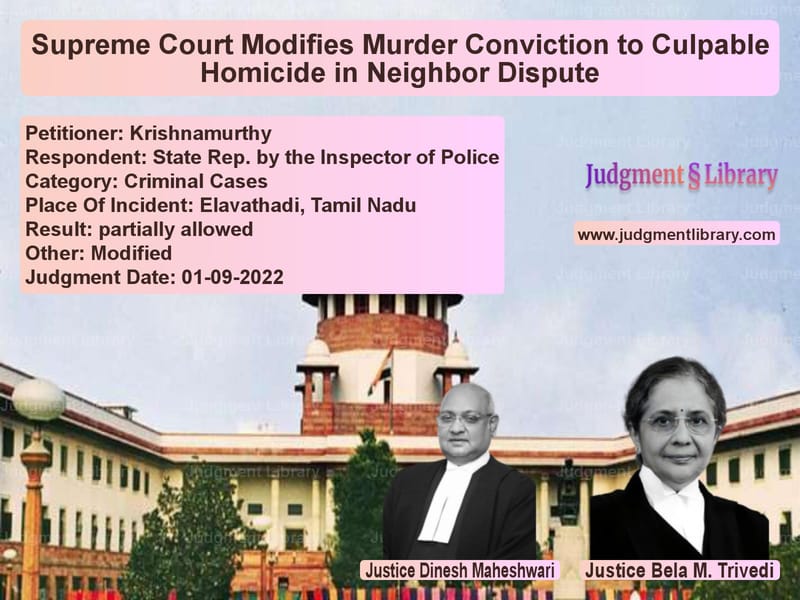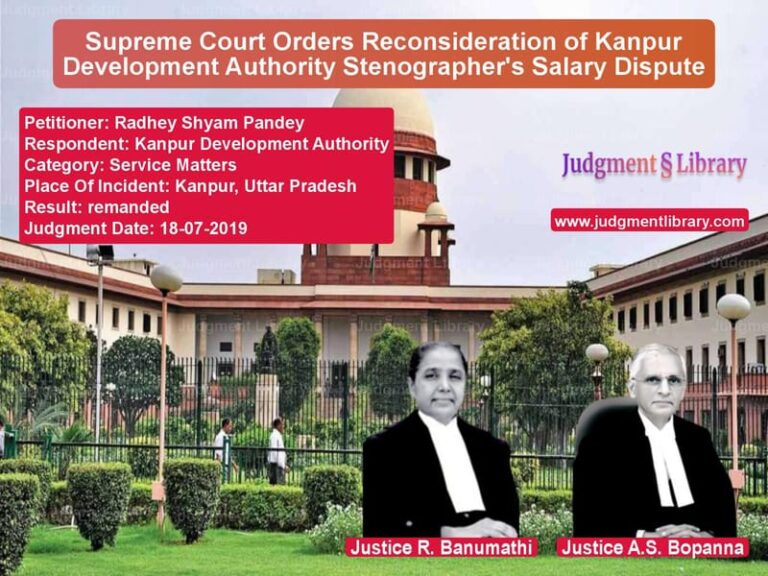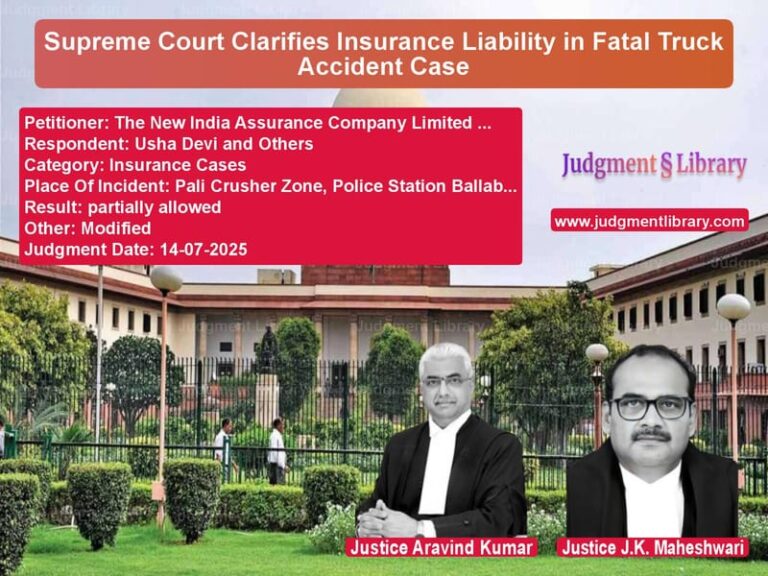Supreme Court Modifies Murder Conviction to Culpable Homicide in Neighbor Dispute
The case of Krishnamurthy v. State represents a legal battle where the Supreme Court was tasked with determining whether a conviction under Section 302 IPC (murder) should be reduced to Section 304(II) IPC (culpable homicide not amounting to murder). This case highlights the significance of intent, the role of evidence, and the importance of proportionality in sentencing.
Background of the Case
The incident took place in Elavathadi village, where Krishnamurthy (the appellant) and his co-accused, Govindaraj and Selvaraj, were neighbors of the deceased, Samidurai. A quarrel broke out regarding a missing goat belonging to Samidurai. The dispute escalated when Govindaraj allegedly assaulted Samidurai’s son with an iron rod. The following night, the three accused returned to the deceased’s house, armed with weapons, and physically assaulted him.
During the assault, Krishnamurthy hit Samidurai on the head with a wooden log, Govindaraj used an iron pipe to strike his chest, and Selvaraj also attacked him with a wooden log. Samidurai succumbed to his injuries the next day at the hospital. Based on a complaint lodged by his son, a police investigation led to the filing of charges under Section 302 IPC (murder) and Section 34 IPC (common intention).
Read also: https://judgmentlibrary.com/supreme-court-dismisses-review-petition-in-madhya-pradesh-murder-case/
Trial Court Verdict
The Sessions Court found all three accused guilty and sentenced:
- Govindaraj (Accused No.1) under Sections 294(b), 324, and 302 IPC.
- Krishnamurthy (Accused No.2) under Section 302 IPC.
- Selvaraj (Accused No.3) under Section 302 IPC read with Section 34 IPC.
High Court Judgment
The High Court, upon appeal, modified the sentences:
- Govindaraj’s conviction was reduced to Sections 324 and 294(b) IPC, with two years of rigorous imprisonment.
- Selvaraj’s conviction was reduced to Section 323 IPC, with one year of simple imprisonment.
- However, Krishnamurthy’s conviction under Section 302 IPC was upheld, and he was sentenced to life imprisonment.
Arguments by the Petitioner
Krishnamurthy appealed to the Supreme Court, arguing:
- That his role was not intentional in causing the death of the deceased.
- He was only armed with a wooden log, which is not a lethal weapon like an iron pipe.
- The injuries caused by him alone could not have resulted in the death.
- His co-accused had been given lighter sentences, so he should not be singled out for a harsher punishment.
- The case should be considered under Section 304(II) IPC instead of Section 302 IPC, as he lacked the intent to kill.
State’s Counterarguments
The State contended:
- Krishnamurthy had actively participated in the assault, leading to the death of the victim.
- There was clear medical evidence that the blows from the accused contributed to fatal injuries.
- Both lower courts had rightly concluded that he was guilty of murder.
- There was no reason to interfere with his conviction under Section 302 IPC.
Supreme Court’s Observations
The Supreme Court carefully analyzed the role of each accused and noted inconsistencies in how their sentences were determined. Key observations included:
1. Lack of Intent to Cause Death
The Court noted that the High Court itself had stated that Krishnamurthy’s actions were “not done intentionally to cause the death of the deceased.” Despite this, he was convicted under Section 302 IPC, which requires intent.
Read also: https://judgmentlibrary.com/supreme-court-declares-petitions-infructuous-in-gujarat-riot-cases/
2. Disproportionate Sentencing
The Supreme Court questioned why Krishnamurthy alone was convicted under Section 302 IPC while his co-accused received lesser punishments. The Court observed that the attack was a group assault and no single individual had inflicted fatal injuries alone.
3. Nature of the Weapon and Injuries
Krishnamurthy used a wooden log, whereas Govindaraj used an iron pipe, which is more dangerous. The medical report showed subdural hematoma and rib fractures, but it did not prove that Krishnamurthy’s attack alone caused death.
Supreme Court’s Final Ruling
The Court ruled that Krishnamurthy’s actions did not amount to murder under Section 302 IPC but were instead culpable homicide under Section 304(II) IPC. The judgment stated:
“We are of the considered opinion that it could not be said by any stretch of imagination that the appellant had an intention to cause such injuries to the deceased-Samidurai so as to cause his death.”
The Supreme Court modified his conviction as follows:
- Conviction changed from Section 302 IPC to Section 304(II) IPC.
- Sentence reduced to 10 years of imprisonment.
- Fine of ₹10,000 imposed.
- Since Krishnamurthy had already served more than 10 years in prison, he was ordered to be released immediately.
Conclusion
The Supreme Court’s decision highlights the importance of proportionality in sentencing and the distinction between murder and culpable homicide. It reiterates that the presence of intent is crucial for a conviction under Section 302 IPC. This ruling sets a precedent that courts must carefully evaluate each accused’s role in a group assault before assigning sentences.
Petitioner Name: Krishnamurthy.Respondent Name: State Rep. by the Inspector of Police.Judgment By: Justice Dinesh Maheshwari, Justice Bela M. Trivedi.Place Of Incident: Elavathadi, Tamil Nadu.Judgment Date: 01-09-2022.
Don’t miss out on the full details! Download the complete judgment in PDF format below and gain valuable insights instantly!
Download Judgment: krishnamurthy-vs-state-rep.-by-the-in-supreme-court-of-india-judgment-dated-01-09-2022.pdf
Directly Download Judgment: Directly download this Judgment
See all petitions in Murder Cases
See all petitions in Attempt to Murder Cases
See all petitions in Judgment by Dinesh Maheshwari
See all petitions in Judgment by Bela M. Trivedi
See all petitions in partially allowed
See all petitions in Modified
See all petitions in supreme court of India judgments September 2022
See all petitions in 2022 judgments
See all posts in Criminal Cases Category
See all allowed petitions in Criminal Cases Category
See all Dismissed petitions in Criminal Cases Category
See all partially allowed petitions in Criminal Cases Category







